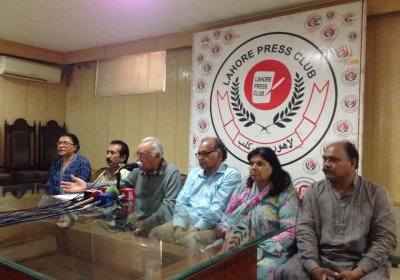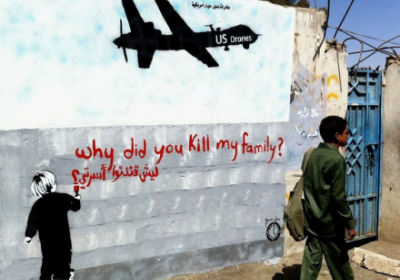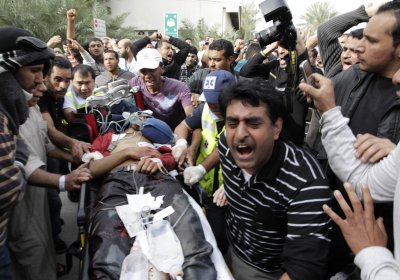The following statement was released by Aasim Sajjad Akhtar, Punjab president of the Awami Workers Party, in response to the Pakistani government stating it intended to join the US-backed Saudi-led military intervention in Yemen.
* * *
Yemen
In the more than four years since mass uprisings ousted dictatorial regimes in Tunisia and Egypt, it can seem that the initial hopes represented by these mass movements lie in tatters.
Libya, Syria, Yemen and Iraq remain mired in bloody armed conflicts that have led to the deaths of hundreds of thousands and displaced millions more within and across borders.
In the pivotal case of Egypt, military rule has returned through the violent crushing of protests, the arrests of an estimated 40,000 people and the rebuilding of the repressive structures of the Hosni Mubarak era.
The New York Times reported on January 26 that “a CIA drone strike in Yemen … killed three suspected al Qaeda fighters on Monday.”
How did they know the identity of the dead? As usual, it was in part because “American officials said.”
There was not a whiff of scepticism about this claim despite the fact that “a senior American official, speaking on the condition of anonymity, declined to confirm the names of the victims” and “a CIA spokesman declined to comment”.
Yemeni President Abdu Rabbu Mansour Hadi, his prime minister and entire cabinet resigned en masse on January 23, just 24 hours after Houthi rebels occupied the presidential compound in Sana'a. The resignations give unprecedented power to the Houthis, a Shi'ite minority from the country’s isolated northern highlands.
The political crisis also opens the door to an all-out war over control of the Yemeni capital, involving Sunni political factions and al Qaeda in the Arabian Peninsula (AQAP). The conflict could also draw in Saudi Arabia, the United States and Iran.
King Abdullah bin Abdulaziz of Saudi Arabia has died at the age of 90. Abdullah was one of the world’s most powerful men and a key US ally in the region, controlling a fifth of the known global petroleum reserves.
In a statement, President Barack Obama praised Abdullah for his “steadfast and passionate belief in the importance of the US-Saudi relationship as a force for stability and security in the Middle East and beyond.”
Protests by Muslims have spread around the world against the anti-Islamic propaganda film Innocence of Muslims.
In response to violent attacks on US embassies in Libya and Yemen, that killed for Americans including the ambassador, US President Barack Obama informed US Congress on September 14 that he had deployed US soldiers “equipped for combat” to the two Arab nations.
The US response to the uprisings in the Arab world remains deeply hypocritical.
“It is time to stop the killing of Syrian citizens by their own government,” US President Barack Obama said at a February 24 meeting in Tunis of the representatives of 60 countries, led by the Western powers and their Arab allies.
The group cynically called itself the “Friends of Syria”.
Secretary of State Hillary Clinton took the opportunity to lash out at the US’s main global competitors, Russia and China.
The latest wave of the bloodshed that has taken place in Yemen since September 18 shows the country’s hated President, Ali Abdullah Saleh, has no intention of leaving power peacefully.
At least 35 people were killed and many more were wounded in government attempts to crack down on protesters between October 15 and 18, The Guardian said on October 18.
Government forces also battled tribal fighters and defected soldiers loyal to anti-Saleh political forces.
While the mainstream media have focused on the fall of Muammar Gaddafi's regime in Libya, democracy movements in Yemen, Syria and Bahrain have deepened despite severe repression.
Hundreds of thousands of people rallied in Yemen's capital Sana'a on September 4, MorningStarOnline.co.uk said the next day. They demanded the removal of President Ali Abdullah Saleh.
Thousands were prevented from rallying by military roadblocks. Five protesters were wounded when government troops opened fire on the rally.
Egyptian scholar and researcher Samir Amin spoke with Hassane Zerrouky on the Arab revolts that have broken out this year, for L'Humanite. The interview was translated by Yoshie Furuhashi for www.mrzine.org . Abridged version appears below.
What's happening in the Arab world six months after the fall of dictator Ben Ali in Tunisia?
US warplanes and drones have been bombing anti-government forces in Yemen amid the uprising against long-time US ally President Ali Abdullah Saleh.
Speaking on condition of anonymity, two US officials said on June 9 that US forces launched an air strike on June 3 against Islamist militants in the south of the country to keep al-Qaida's Yemeni offshoot from taking advantage of the uprising in the Gulf state.
The attack followed a May 5 drone strike on alleged militants, they said.
Sixty-two protesters had been killed by Syrian security forces on April 29, Al Jazeera reported that day. This was the second Friday in a row that Syrian authorities had used lethal forces against protesters — 100 protesters were killed in Deraa on April 22.
The United States responded by imposing sanctions on three leading figures in the regime — including President Bashar al-Assad’s brother, but not the president — and the Syrian intelligence agency.
- Previous page
- Page 4
- Next page








